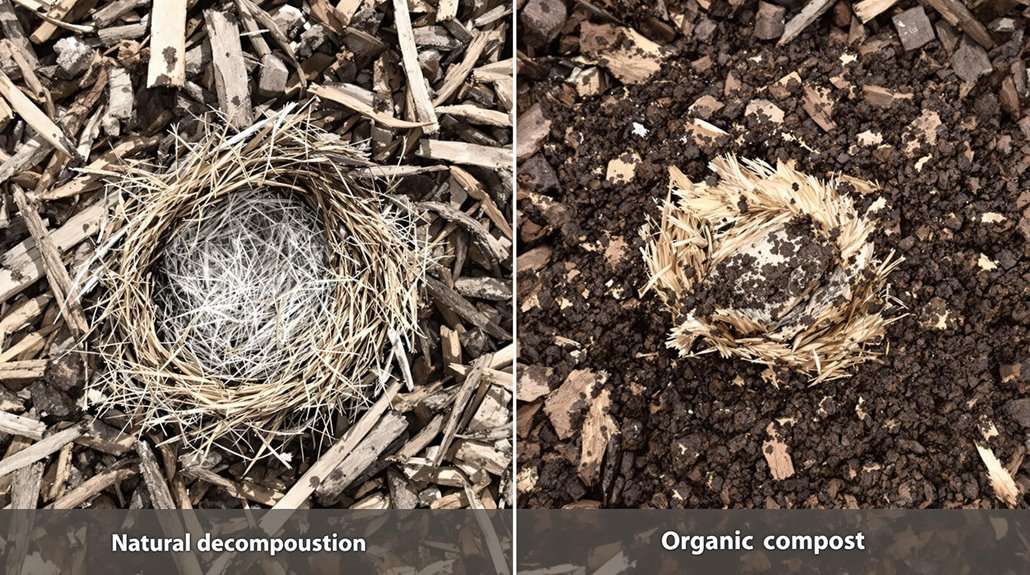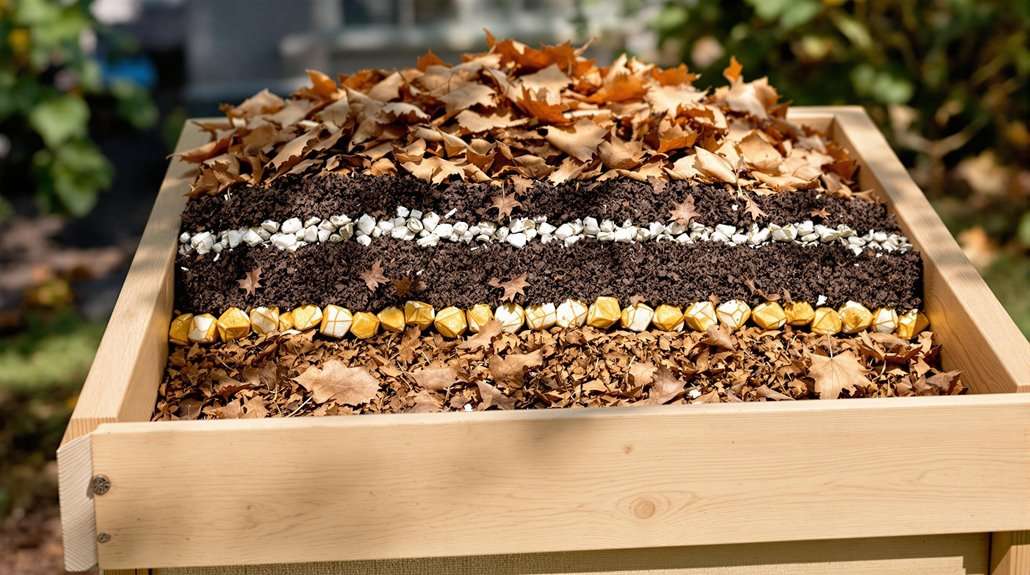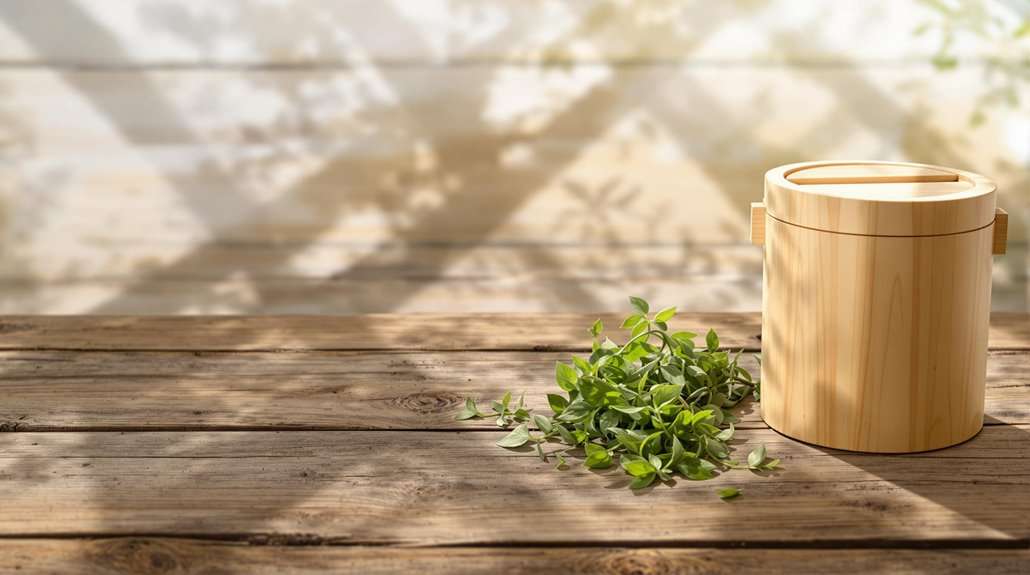Can I Put Biodegradable Wipes in Compost
You shouldn't put biodegradable wipes in your home compost bin, despite what their eco-friendly marketing might suggest. While biodegradable wipes can break down over time, they often contain synthetic materials and chemicals that won't decompose properly in typical backyard composting conditions. These wipes can release microplastics and harmful substances into your compost, potentially contaminating your soil and plants. Instead, look for wipes specifically certified as compostable by organizations like TÜV Austria, or consider using reusable cloth alternatives. For successful composting, you'll want to understand the essential differences between biodegradable and truly compostable materials.
This post may contain affiliate links. If you make a purchase through these links, I may earn a commission at no additional cost to you. Additionally, portions of this post may be generated using artificial intelligence (AI) technology. While we strive for accuracy, please be aware that AI-generated content may not always be perfect and should be fact-checked when necessary.
The Spatula Scoops
- Not all biodegradable wipes are compostable; only use wipes specifically certified as compostable in your compost pile.
- Check for TÜV Austria certification or similar compostability labels before adding wipes to compost.
- Cut certified compostable wipes into smaller pieces and mix with food scraps and yard waste for faster decomposition.
- Most biodegradable wipes contain microplastics and should not go in compost, as they won't fully break down.
- Commercial composting facilities are better equipped to process compostable wipes than home composting systems.
Understanding Biodegradable Vs Compostable Wipes

Many consumers are confused about the difference between biodegradable and compostable wipes, but understanding these distinctions is essential for making environmentally conscious choices. When you're looking at these products, you'll notice that while all compostable items are biodegradable, not all biodegradable items are compostable.
Here's what you need to know: Biodegradable wipes break down into natural elements over time, but they often require specific conditions and can take much longer than you'd expect. They may also release harmful gases and create microplastic particles during decomposition. In contrast, compostable wipes are specifically designed to break down quickly in controlled environments, typically within three months, and they'll contribute positively to soil health. Studies show that biodegradable wipes only achieve 70% biodegradation in landfills.
You'll want to pay attention to certification labels, as many companies use greenwashing tactics to make their products appear more eco-friendly than they are. While biodegradable wipes might sound environmentally friendly, they can actually cause blockages in waterways and won't fully decompose in landfills. Compostable wipes, certified by organizations like TÜV Austria, offer a more reliable and environmentally responsible choice.
Environmental Impact of Wipe Disposal
Despite their eco-friendly marketing claims, biodegradable wipes create significant environmental problems when disposed of improperly. When you toss these wipes in landfills, they're unable to fully decompose, leading to blockages and the production of harmful gases like methane, which is 25 times more potent than carbon dioxide. True compostable certified products decay naturally without releasing toxins into the environment.
You'll find that about 90% of biodegradable wipes contain microplastics, which don't break down completely and can harm wildlife when they enter ecosystems. These wipes only reach about 70% biodegradation before they start releasing toxic emissions, and their slow decomposition process creates ongoing environmental challenges.
The impact extends beyond landfills, as these wipes frequently clog waterways and sewerage systems, resulting in costly cleanup efforts that can exceed $100,000 annually for local authorities. While companies market these products as environmentally conscious choices, they're often engaging in greenwashing – making misleading environmental claims. Instead, you'll achieve better environmental outcomes by using truly compostable wipes, which fully break down into natural elements within 9-12 weeks in controlled composting environments, supporting sustainable waste management practices and reducing your carbon footprint.
Proper Composting Methods

When it comes to composting biodegradable wipes, you'll need to follow specific guidelines to secure proper decomposition. First, verify that your wipes are certified compostable, as biodegradable doesn't always mean they're suitable for composting. You'll want to cut the wipes into smaller pieces to speed up the breakdown process and distribute them evenly throughout your compost pile. Natural and organic wipes with minimal preservatives are best suited for composting.
To create ideal composting conditions, you'll need to maintain a proper balance of green and brown materials. Don't add too many wipes at once; instead, mix them with food scraps, grass clippings, dry leaves, and twigs. Keep your compost pile moist but not waterlogged, and remember to stir it regularly to introduce oxygen, which helps speed up decomposition.
If you can't maintain a home composting system, you've got alternatives. Check if your local commercial composting facilities accept biodegradable wipes, as they often have more efficient systems for breaking down these materials. When in doubt about disposal methods, consult your local regulations and the manufacturer's guidelines to verify you're handling the wipes correctly.
Common Marketing Misconceptions
Several persistent myths cloud people's understanding of marketing in the biodegradable wipes industry. You'll often hear that marketing is simply about advertising, or that a good eco-friendly product will sell itself, but these misconceptions can hinder your product's success in the competitive sustainable goods market. While it's true that biodegradable wipes have compelling environmental benefits, effective marketing requires a thorough strategy that goes beyond basic promotion.
When marketing biodegradable wipes, you'll want to avoid these common pitfalls:
- Targeting too broad an audience instead of focusing on environmentally conscious consumers
- Expecting immediate results from your green marketing campaigns without allowing time for market education
- Relying solely on social media while neglecting other valuable marketing channels
Understanding your target audience's environmental concerns and shopping habits is essential for successful marketing. You'll need to invest time in market research, develop consistent messaging about your product's biodegradable features, and build relationships with environmentally conscious consumers. Remember that marketing isn't just about attracting new customers; it's also about retaining existing ones through education about proper product disposal and composting methods. Long-term dedication is crucial for creating and maintaining effective marketing strategies that deliver measurable results.
Sustainable Alternatives for Clean Living

Making sustainable choices for your cleaning routine doesn't have to be complicated. When it comes to wipes, you'll want to understand the key difference between biodegradable and compostable options to make informed decisions. While biodegradable wipes will break down naturally over time, they're not always suitable for your compost heap and should typically go in the trash. Natural microbes are responsible for breaking down biodegradable materials into harmless byproducts.
For composting, you'll need to specifically choose wipes that are certified compostable and made from 100% natural, chemical-free materials. Look for trusted certifications like TÜV Austria's OK compost label to guarantee you're using genuinely compostable products. When you add these wipes to your compost, you're not only diverting waste from landfills but also creating valuable soil amendments for your garden.
If you're aiming for the most eco-friendly option, consider switching to reusable, plastic-free wipes made from organic materials. Whatever you choose, never flush wipes unless they're specifically certified as flushable, and always check the packaging for proper disposal instructions. By understanding these distinctions, you're taking meaningful steps toward reducing your environmental impact.
Frequently Asked Questions
How Long Does It Take for Biodegradable Wipes to Decompose in Home Gardens?
You'll find that biodegradable wipes' decomposition time in home gardens varies greatly based on environmental conditions. In ideal conditions with proper moisture, temperature, and microbial activity, they'll break down in 1-3 months. However, if conditions aren't perfect, it can take 6-12 months. For faster decomposition, you can cut the wipes into smaller pieces and guarantee they're mixed well with other composting materials.
Can Biodegradable Wipes Be Mixed With Food Waste in Composting Bins?
You can mix biodegradable wipes with food waste in composting bins, but you'll need to follow specific guidelines. First, guarantee your wipes are certified compostable and free from synthetic materials. Cut them into smaller pieces before adding them to your bin, and maintain a proper balance with food waste. Don't overload your compost with wipes – they should make up no more than 10% of your total compost mixture.
Do Biodegradable Wipes Affect the Quality of Resulting Compost?
Biodegradable wipes can greatly impact your compost's quality, depending on their composition. You'll need to watch out for wipes containing synthetic additives or chemicals, as these can harm beneficial microorganisms and potentially contaminate your finished compost. To maintain high-quality compost, you should only use wipes that are certified compostable and free from harmful substances. Even then, it's best to add them in moderation to maintain proper nutrient balance.
What Happens if I Accidentally Compost Non-Compostable Biodegradable Wipes?
While you're trying to be eco-friendly, accidentally composting non-compostable biodegradable wipes can harm your carefully nurtured compost. You'll likely notice contamination of your pile, as these wipes won't break down properly and may release harmful chemicals. They'll disrupt your compost's ecosystem, interfere with microbial activity, and could leave visible remnants. The resulting compost might harm your plants and create barriers in the soil that affect nutrient absorption.
Are There Specific Temperature Requirements for Composting Biodegradable Wipes?
While home composting doesn't have strict temperature requirements for biodegradable wipes, they'll decompose faster in warmer conditions. Industrial facilities maintain temperatures above 55°C (131°F) for ideal breakdown, but your backyard compost will work at ambient temperatures. You'll get better results if you maintain a slightly warm, moist pile and turn it regularly to promote decomposition, though the process will take longer than in commercial settings.





